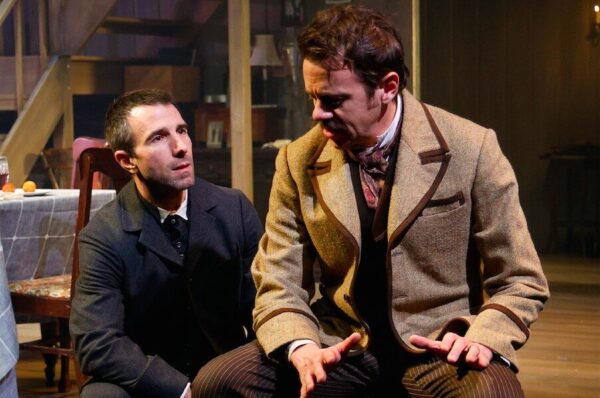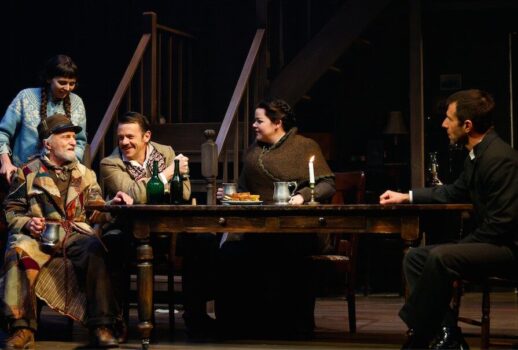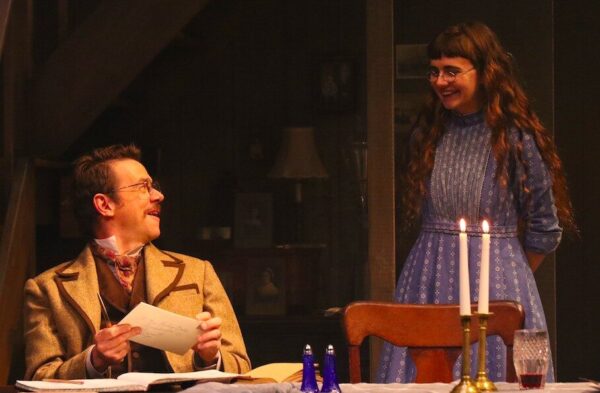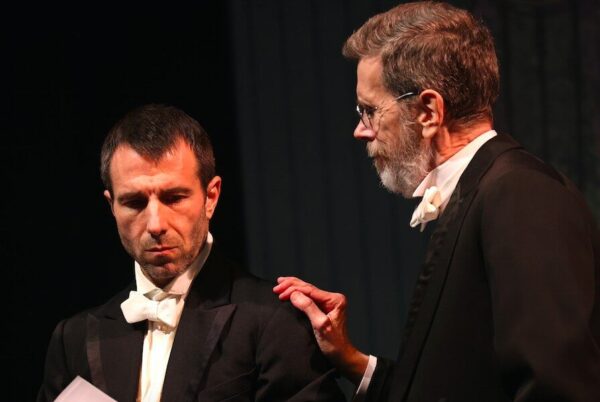The Wild Duck (1884) is the red-headed stepchild among Henrik Ibsen’s classic plays. It seems every time a high-powered actress best known for her film or TV work wants to establish her stage chops, we get a fresh production of A Doll’s House or Hedda Gabler, or sometimes Ghosts. In fact, Duck has not flown over Broadway since 1967 when it was part of Ellis Rabb’s legendary APA repertory. This is probably because Duck is an ensemble work while the previously mentioned Ibsen dramas provide Tony-bait female star-vehicle opportunities. (I’ve only previously seen Duck in a BBC TV staging.) This is a shame because the play is a shattering naturalistic depiction of the effects of illusion on a downtrodden family, prefiguring American treatments on the subject such as Miller’s Death of a Salesman and O’Neill’s The Iceman Cometh. Ibsen displays compassion for the Ekdal household which manages to struggle decently along despite deeply hidden secrets and deceptions. The most destructive character of the piece turns out to be a well-intentioned, but misguided idealist whose insistence on exposing the family’s hidden truths leads to tragic consequences.

Credit: Gerry Goodstein
Simon Godwin’s staging in a co-production from Theater for a New Audience and Washington DC’s Shakespeare Theater Company (where Godwin is artistic director), is a refreshing and intense take on this neglected classic, which strikes the perfect balance between humor and pathos. There are no high-tech concepts or gimmicks in the staging which, along with first-class acting, humanizes all of the characters. There are no villains or heroes here, just flawed, earnest human beings trying to cope the best way they can in difficult circumstances. Godwin allows us to laugh at their foibles, and this makes their sad ends all the more devastating. David Eldridge’s lucid translation, which premiered at the Donmar Warehouse in 2005, blows the dust off Ibsen’s play and makes it speakable and contemporary.
The most comical and ultimately tragic figure is Hjalmar Ekdal (Nick Westrate, part clown and part beaten-down Everyman), a small, working-class man with delusions of grandeur, believing an unspecified invention will someday make him a rich man. His father (a brilliantly underplaying David Patrick Kelly), takes refuge in hunting rabbits in the family’s loft after a ruinous prison sentence for a crime for which he was not entirely responsible. Old Ekdal’s partner in that crime, his employer the wealthy and influential Hakon Werle (frosty and fiery Robert Stanton), took no blame and lives prosperously. In addition, In order to cover up his affair with his then housekeeper Gina (sturdy and determined Melanie Field), Werle has engineered her marriage to Hjalmar. Werle’s estranged son Gregers (a complex Alexander Hurt) is the wrongheaded idealist set on ripping away the Ekdals’ comfortable “life lies” and Gina and Hjalmar’s innocent loving daughter Hedvig (Maaike Laanstra-Corn in an intense and almost feral performance) pays the ultimate price for his interference. The titular aquatic fowl, kept in the Ekdals’ loft, represents Hedvig’s unblemished, natural love wounded by the machinations of the grown-ups who surround and capture her. Ironically, Gina and Hjalmar work as photographers, retouching pictures to give a more pleasing view of their subjects, just as they adjust the circumstances of their marriage.

Nick Westrate, Melania Field and Alexander Hurt in The Wild Duck.
Credit: Gerry Goodstein
Godwin and his cast are not afraid of playing up the comic moments amidst the tragedy. Laughs are derived from Hjalmar’s predictably weak, self-centered reactions to the burdens life is imposing on him (marvelously played by Westrate), and from the cynical, accurate observations of their border, Dr. Rellig (emotionally resonant Matthew Saldivar), who speaks for the playwright.
In addition to the exemplary performers already mentioned, there is admirable work from an ebullient Mahira Kakkar as Mrs. Sorby, Werle’s frank and fun-loving mistress who has no trouble embracing her life decisions, and Alexander Sovronsky who provides lively and somber violin music to bridge the scenes. Laanstra-Corn, who was so memorable in Grief Camp at Atlantic Theater Company, is a young actress to watch. She economically and feelingly conveys Hedvig’s desperate need for affection, her sparkling intelligence and the aching emptiness of her father’s alienation.
We see all the motives and reasoning behind each character’s actions and all, even those of the manipulative Werle and his wrongheaded son Gregers, are understandable if not justifiable.

Credit: Gerry Goodstein
Andrew Boyce’s set design reflects the upper-class pretensions of Werle’s home and the more rustic, warm environment of the Ekdals’, with Stacey DeRosier’s evocative lighting providing the proper shifting moods. Heather C. Freedman’s period costumes delineate character with style. Among her smart choices is an ostentatious fur overcoat for Werle which gets a laugh of its own and tells you all you need to about this commanding figure. This is a rich Wild Duck, and hopefully will lead to more productions of Ibsen’s overlooked masterpiece.
Sept. 14—28. Theater for a New Audience and Shakespeare Theater Company at Polonsky Shakespeare Center, 262 Ashland Pl., Brooklyn, NY. Running time: two hours and 20 mins. including intermission. tfana.org.

Credit: Hollis King
